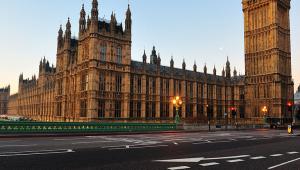By Jaimie Kaffash
18 November 2010
The first elected chair of the Treasury select committee seems to be in good shape to take on ministers, with a background as an economist and adviser to chancellors. And he’s proud to be exercising independence, he tells Jaimie Kaffash
Public spending is undergoing an extreme slimming regime. Led by its own Mr Motivator in Chancellor George Osborne, the nation is hoping that the new leaner state will be more economically healthy.
Since Osborne’s four-year plan was announced, the Treasury select committee has been chewing over the figures. It has called up the great and the good for evidence sessions, from the chancellor himself to Institute for Fiscal Studies acting director Carl Emmerson and former Cabinet secretary Andrew Turnbull, all in an energetic two-weeks.
Its new chair Andrew Tyrie, in arguably the most powerful backbench position in the Commons, is relishing cutting ministers down to size. As a keen runner, he is feeling fit for the challenge.
And what a time to take on the role. In the past two weeks, Osborne has used the forum of the committee to announce the date of the next Budget (March 23) and to propose scrapping Whitehall’s traditional spending structure of Departmental Expenditure Limits and Annually Managed Expenditure.
The committee’s eagerly awaited report on the Comprehensive Spending Review should be out before Christmas.
Tyrie – a slim man, despite his self-confessed big appetite – leads us down to the quaintly named Adjournment Café in Portcullis House, stopping midway to chat about freedom of information requests with Cabinet Office minister Francis Maude.
He is cautious about giving away details of the CSR report but stresses that the cuts ‘are not a bolt from the blue, and would have happened whoever won power’. Public expenditure at just under 50% of gross domestic product – as it was after the banking crisis – was unsustainable, ‘irrespective of the deficit’, he adds. The coalition is simply bringing the proportion down to pre-2008 levels.
Tyrie’s head for economics means he should be listened to. Michael Prescott of the Sunday Times described him as ‘one of the brightest politicians of his generation’. However, he qualified this by highlighting critics’ claims of ‘arrogance and an untuned political antennae’.
But no-one can deny that Tyrie’s background seems tailor-made for the Treasury committee role. The 53-year-old Essex-born Conservative, now MP for Chichester, is a fellow of Nuffield College in Oxford and was previously senior economist at the European Bank for Reconstruction and Development. But it was his experience as a special adviser to former chancellors Nigel Lawson and John Major that gave him invaluable experience of the machinations of the Treasury. His greatest lesson, he says, was learning how important time-planning and logical thinking are to the success of the department. And on this score he cites ministers’ work on education and welfare spending as particularly well-thought-out.
The focus on welfare reform, the hot political topic, is apt. The interview coincides with Work and Pensions Secretary Iain Duncan Smith’s announcement of the Universal Credit, which will pump in billions of pounds in the short term in the hope it will save on welfare spending further down the line. Everyone agrees that change is needed, Tyrie says, and if these ‘bold’ reforms work, they will have a huge impact.
And if they do not? ‘Well, we cannot deal with hypotheticals,’ he responds, saying Duncan Smith had not even finished delivering his speech. But almost immediately, the work secretary himself walks into the canteen. In this age of austerity, lunches in Michelin-starred restaurants are not the order of the day, even after a big policy announcement.
Watching the costs is of course now de rigueur in Whitehall, making Tyrie’s scrutiny role more vital than ever. And his position has gained even more gravitas, as it is part of the first wave of select committee chairs to be elected. Tyrie – a surprise winner, ahead of fellow Conservative Michael Fallon – says the elections have conferred greater legitimacy on to the committee system. ‘This means I am as accountable to Opposition MPs as to my own party’s,’ he adds.
The Treasury committee’s influence in particular was highlighted at the start of this Parliament when it was granted the power to veto ministers’ candidates for membership of the OBR. Importantly, he adds, the removal of any members of the office requires the committee’s ratification, ensuring its independence from government. This power has led to the government and the committee agreeing the appointment of former IFS director – and government critic – Robert Chote as the OBR chair.
Would George Osborne have been so eager to hand this much power to a committee chaired by a disruptive Opposition MP? ‘Because I am a Tory patsy?’ he laughs. But nobody could accuse him of following the party line unquestioningly, he says. He cites his campaigning against the hereditary peerage system, extraordinary rendition and, most notably, the Iraq War. Recent examples include his criticism of coalition defence plans. He compares the ‘two aircraft carriers which for a decade will not carry any aircraft’ to ‘an episode of Yes, Minister in which Jim Hacker discovers that a hospital does not have any patients’.
He adds: ‘No doubt I have made my share of mistakes. But I have tried to exercise some independence of mind to think what is right. And the record shows that I have been prepared on occasion to speak and vote in ways outside the party lines and I will continue to do so in this job.’
So how do others think Tyrie and the select committee are shaping up?
The chief economist of the Institute for Public Policy Research, Tony Dolphin, says the chair has lived up to his claim of independence. Tyrie, he says, ‘is not historically associated with being on the Left of the party’. But ‘the questions he was asking the chancellor and the chief secretary were tough questions that Labour members would have been happy to put forward,’ he adds. ‘He does seem to be acting as a backbencher’s backbencher’ – a trait similar to his well-respected predecessor, Labour’s John McFall.
Others agree – Tyrie has twice won the Spectator magazine’s backbencher of the year award.
But the committee has a struggle ahead. Dan Corry, senior economic adviser to Gordon Brown when he was prime minister, says that, even with Tyrie’s experience at the helm, it has been tough so far.
‘One of the troubles you’ve got as a committee, is that ministers will be very well briefed,’ he says. ‘The committee has seen the chancellor and the chief secretary to the Treasury and I don’t think the members got much out of them.
‘I think they have to find different angles into this. If I look back at the work best done by the previous committee, it was often not so much when they were grilling and trying to catch out ministers, it was when they were looking at different angles.’
With the public finances continuing to dominate, the role of the Treasury committee will be more important than ever. The government claims that exercising restraint, cutting out waste and detoxifying assets are essential to the state’s wellbeing. Hopefully, vigorous check-ups from an emboldened committee system will not just be a passing fad but will help to get the economy healthy and keep it that way.



















